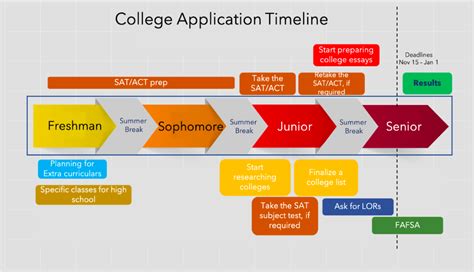For aspiring PhD students, understanding the application timeline is essential to ensuring a successful application process. While specific deadlines may vary by university and program, there are general patterns to consider:

August-September:
- Many universities begin accepting applications for fall admission in August or September.
- Submitting applications early allows for ample time for review and potential interviews.
October-November:
- The majority of universities have application deadlines in October or November for the following fall semester.
- Late applications may be accepted, but they may have a lower chance of consideration.
December-January:
- Some universities may offer extended deadlines or rolling admissions that allow applications to be submitted throughout the academic year.
- However, it is important to note that earlier applications have a higher success rate.
February-March:
- Some programs may have a separate application cycle for spring admission.
- Spring deadlines tend to be earlier than fall deadlines.
April-May:
- Decisions on PhD admissions are typically made by April or May.
- Universities send out acceptance letters and offer funding packages to successful applicants.
Important Considerations:
1. Program Deadlines:
Verify specific application deadlines for the programs you are interested in. Universities often have different deadlines for different departments.
2. Fellowships and Funding:
Investigate scholarship and fellowship opportunities that may be available to PhD applicants. Early applications increase the likelihood of securing financial support.
3. Graduate Record Examination (GRE):
If required by the program, register and prepare for the GRE well in advance. The GRE scores must be submitted with the application.
4. Letters of Recommendation:
Request letters of recommendation from professors and mentors who can attest to your academic abilities and research potential.
5. Statement of Purpose:
Craft a compelling statement of purpose that highlights your research interests, skills, and career aspirations.
6. Curriculum Vitae (CV):
Prepare a comprehensive CV that provides a summary of your education, research experience, and accomplishments.
Pain Points for PhD Applicants:
- Intimidating Process: The PhD application process can be complex and overwhelming, especially for first-time applicants.
- Competitive Field: PhD programs are highly competitive, with acceptance rates ranging from 5% to 20%.
- Time Constraints: Balancing the application process with academic commitments and personal life can be challenging.
- Financial Concerns: PhD programs are typically tuition-based, and securing funding is crucial for most students.
Motivations for Pursuing a PhD:
- Passion for Research: A PhD allows individuals to delve deeply into their chosen field and contribute original research.
- Career Advancement: A PhD opens doors to numerous career paths in academia, industry, and government.
- Intellectual Curiosity: PhD programs foster critical thinking, problem-solving abilities, and a lifelong love of learning.
- Personal Growth: The PhD journey promotes self-discovery, resilience, and a profound understanding of one’s field.
Step-by-Step Approach to PhD Applications:
- Research Programs: Identify universities and programs that align with your research interests.
- Contact Faculty: Reach out to potential advisors to discuss your project ideas and assess their mentorship style.
- Prepare Application Materials: Gather all necessary documents, including transcripts, letters of recommendation, and a statement of purpose.
- Meet Deadlines: Submit applications on time to increase your chances of admission.
- Follow Up: After submitting your application, contact the admissions office to follow up on its status and provide additional information if necessary.
- Interview Preparation: If invited for an interview, prepare thoroughly by researching the program and practicing answering common interview questions.
Frequently Asked Questions:
- When should I start the PhD application process?
- Begin researching programs and preparing application materials a year or two in advance of the target application deadline.
- How can I improve my chances of admission?
- Maintain a strong academic record, engage in research, and obtain mentorship from professors who can support your application.
- What if I miss the primary application deadline?
- Some universities may offer extended deadlines or rolling admissions, but it is important to contact the admissions office for specific information.
- Can I apply to PhD programs without a master’s degree?
- In some cases, universities allow students to enter PhD programs directly from a bachelor’s degree. However, it is important to research specific program requirements.
- How long does it take to earn a PhD?
- The typical timeline for a PhD program is 4-8 years, depending on the field of study and the pace of research.
- What career opportunities are available for PhD graduates?
- PhD graduates have a wide range of career options, including academia, research institutions, industry, and government.
